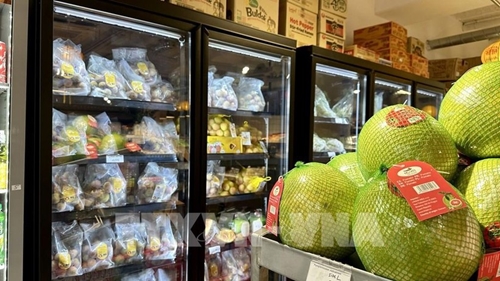Durian, dragon fruit, jackfruit, and banana remain major currency earners, said Chairman of the Vietnam Fruit and Vegetables Association Nguyen Thanh Binh.
He predicted the positive trend will continue, citing abundant domestic supply and rising demand from both traditional and emerging markets. This optimism is further bolstered by the arrival of peak harvest seasons for key fruits like durian, dragon fruit, pineapple, watermelon, mango, longan, and lychee.
    |
 |
|
Vietnamese fruits are sold in a French supermarket |
However, Director of the Department of Crop Production under the Ministry of Agriculture and Rural Development (MARD) Nguyen Nhu Cuong highlighted a potential challenge. Unfavorable weather conditions have significantly reduced the preliminary estimate for lychee production in 2024. The current forecast sits at around 200,000 tons, a decrease of nearly half compared to 2023.
The northern province of Bac Giang, a major lychee producer, exemplifies this challenge. The provincial Department of Agriculture and Rural Development estimated an output of over 100,000 tons from its 29,700 ha of lychee trees, which is just half of what it achieved in 2023. The province expects lychee exports to reach around 70,000 tons this year, representing 70% of the total output.
Despite the lychee setback, proactive measures are underway. Since the year's beginning, the northern province of Hai Duong, another large producer of this fruit, has collaborated with Government agencies to hold numerous trade promotion events targeting China, Japan, the US, France, Malaysia, and the Republic of Korea (RoK). Notably, its Thanh Ha district boasts 500 ha of lychee certified under VietGAP and GlobalGAP standards. The district also maintains 167 export-eligible production unit codes and 12 facilities with 21 licensed export packaging facility codes this year.
To facilitate the export of lychee to Japan, the Northeast Asian country's Ministry of Agriculture, Forestry and Fisheries has sent two plant quarantine experts to Vietnam to monitor the packaging, processing, and certification procedures for lychee shipments destined for Japan.
Looking beyond lychee, the MARD is actively pursuing market expansion. This includes ongoing negotiations to remove technical and trade barriers for agricultural products in traditional markets like China, the US, the EU, Russia, Japan, and the RoK. The ministry is also setting its sights on promising new markets, including Halal countries, the Middle East, and Africa. A key focus is to soon secure a protocol for the export of frozen durian and fresh coconut to China, according to Cuong.
Source: VNA